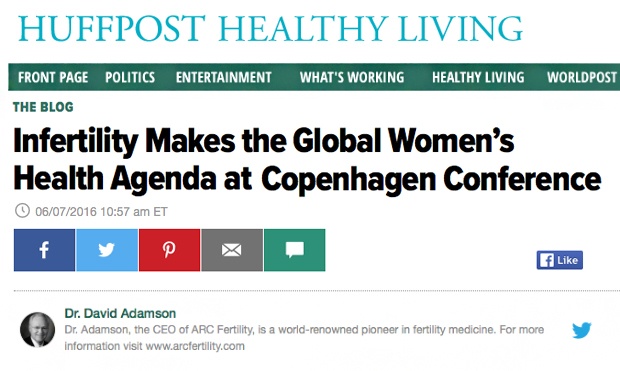Infertility was a topic of discussion at the world’s largest women’s health and rights conference just held in Copenhagen by Women Deliver. While reproductive health issues such as maternal health and infant mortality are often the focus among global health topics, infertility is often not.
This year’s conference attracted worldwide interest with more than 5,500 conference participants drawn from government ministers, policy makers, business leaders, non-government organizations (NGOs), activists, celebrities and royalty to focus on how to improve the lives of girls and women by 2030. Issues discussed included child marriage, maternal mortality, and violence against women.
With the help of Planned Parenthood and active involvement by the World Health Organization (WHO), infertility was on the agenda for discussion. The new Director of Reproductive Health and Research for WHO — Dr. Ian Askew — spoke of the magnitude of infertility’s unmet need for care and prevention. While definitions vary, estimates place the number of couples of reproductive age affected by infertility worldwide at between 48.5 and 186 million couples. It’s a significant global health issue.
According to Askew, WHO’s work on infertility now includes “advocacy for a strong response to the unmet met need for infertility care services; development of infertility diagnosis and care guidelines; and research to answer priority questions.” He added that the topic is “an integral part of reproductive health care highlighted in Women Deliver’s Strategic Development Goal (SDG) 3.7 – universal access to sexual and reproductive healthcare services, including for family planning, information and education.”
Using the conference’s broader framework of gender equality and social justice to examine women’s health helps advance the discussion of infertility as it has often been viewed from an economic perspective at the global level. Although there are clear economic consequences with the lack of social security in old age and disinheritance, the impact is much more profound. Infertility affects the physical and mental health of women, men and families, their relationships and may have cultural and religious implications. For many, not having children is stigmatizing.
Along with WHO, Planned Parenthood and Women Deliver, international professional organizations of fertility specialists such as the International Committee Monitoring Assisted Reproductive Technologies (ICMART) and the International Federation of Gynecology and Obstetrics (FIGO) continue to advance education and research and outreach. This work brings together experts from all over the world to standardize terminology, establish care guidelines and share data, among other things.
For those who follow global women’s health issues, these are all promising developments and some have been years in the making. However, despite the great expansion in treatment options for infertility over the past 15 years, particularly Assisted Reproduction Technology (ART), there remains distinct inequity within and among countries.
No matter where you live — Kenya or Denmark or the US — infertility is intensely personal. Still, the reality of the enormous unmet need for infertility treatment and the reasons why, also make it political, economic and a matter of social justice and gender equality. No matter where you live, the issue deserves attention and discussion.
What does this all mean if you’re living in the US and facing infertility? A few things: from a high level, it means you’re part of a movement that recognizes that infertility is a life-changing health condition that can affect anyone — no matter where they live, their ethnicity, religion or income. And, it means you have the support of many — families, health professionals, NGOs, activists and governments that know we can do better. Because we can.
For those who reside in the US, the good news is that you have access to specialists who are trained in the most advanced infertility treatments available today. Unfortunately, access is not availability. Estimates suggest that only one in four couples who face infertility are able to receive treatment. A patchwork of healthcare coverage — from employers, in public programs, among insurers and state-to-state — mean you and your partner may not be able to receive needed treatment unless you are in a position to pay for all or part of it on your own.
Part of the mission of my organization is to offer support wherever possible with patient education resources, creative financing options and partnerships to advocate for better coverage with public and private employers, insurers and federal and state policymakers.
Healthcare — including having babies — may be local but there’s a campaign afoot at the state, national and yes, global level to make infertility treatment a reality for more people. After all, the desire to have a family is universal.


